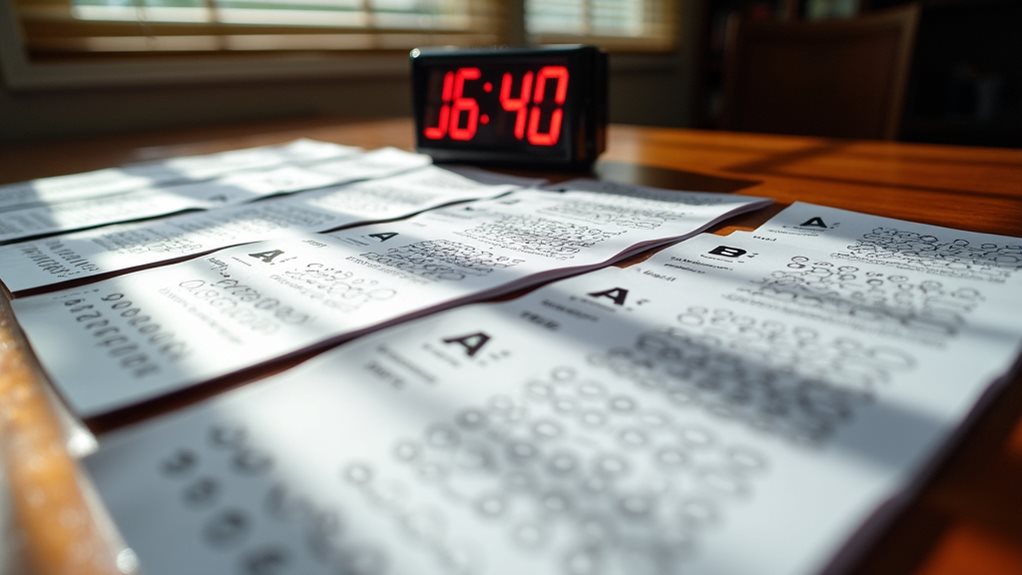Yes, the SQE 1 exam consists entirely of multiple-choice questions, divided into two separate assessments called FLK1 and FLK2. You’ll face single best answer questions that test your legal knowledge and analytical skills across various subjects. While the format might seem straightforward, it requires thorough preparation and strategic thinking, as the pass rates hover around 50-60% for first attempts. Understanding the specific question types and practicing effective time management will greatly boost your chances of success.
Understanding the SQE 1 Multiple Choice Format

While many assume the SQE 1 consists solely of multiple choice questions, it’s important to understand that this isn’t the case. The SQE format incorporates various assessment methods designed to thoroughly evaluate your legal knowledge and skills.
The SQE 1 goes beyond simple multiple choice, using diverse assessment methods to comprehensively test legal expertise.
You’ll encounter single best answer questions alongside other testing formats that demand critical analysis and practical application of legal principles.
When preparing for the exam, you’ll need to familiarize yourself with different question types and response formats. The assessment methods include scenario-based questions, where you’ll analyze complex legal situations and select the most appropriate solution from multiple options. Notably, the pass rates for SQE1 hover around 50-60% on first attempts, reflecting the difficulty of mastering subtle legal nuances under time pressure.
Understanding these diverse formats is essential for your success, as each type tests different aspects of your legal comprehension and decision-making abilities.
Benefits and Challenges of MCQ Assessment in Legal Education
Multiple choice questions represent both opportunities and limitations in legal education assessment. The benefits of MCQs include objective grading, thorough coverage of topics, and quick feedback that helps you gauge your understanding. You’ll also find they’re excellent tools for practicing time management and developing systematic problem-solving skills.
However, the challenges of MCQs shouldn’t be underestimated. They can sometimes oversimplify complex legal concepts and may not fully test your ability to construct detailed legal arguments. You’ll need to adapt your study approach, as MCQs require different preparation techniques than essay-based assessments. They can also include subtle distinctions designed to test your precise knowledge, making it essential that you develop strong analytical skills to identify the truly correct answer among plausible alternatives. Additionally, achieving a good SQE score can significantly impact your confidence and readiness for the legal profession.
Comparing SQE 1 to International Legal Qualifying Exams
The SQE 1‘s format closely mirrors several international legal qualifying exams, though each has its distinct characteristics. When you’re preparing for the SQE 1, it’s helpful to understand how it compares to other qualifying exams worldwide, as this knowledge can enhance your study approach and expectations.
Understanding the SQE 1’s relationship to global legal exams provides valuable insights for optimizing your preparation strategy.
- The Uniform Bar Examination (UBE) in the United States includes multiple-choice sections similar to SQE 1, but also incorporates essay questions.
- Australia’s PLT assessment focuses more on practical legal training compared to SQE 1’s theoretical framework.
- Canada’s NCA exams combine both multiple-choice and long-form answers, offering a hybrid approach.
- The New York Bar Exam’s multiple-choice section shares methodological similarities with SQE 1’s assessment style.
Additionally, knowing the national pass rates for SQE 1 and SQE 2 can provide insights into the exam’s difficulty level and preparation requirements.
Understanding these international exams’ structures helps you contextualize the SQE 1’s requirements and adapt your preparation strategies accordingly.
Preparing Effectively for SQE 1 MCQ Questions

Since tackling multiple-choice questions requires a strategic approach, you’ll need to develop specific techniques to master the SQE 1’s MCQ format.
Start by analyzing past questions, focusing on understanding the patterns in how answers are structured. Your study strategies should include creating flashcards for key legal concepts and practicing timed mock tests regularly.
To enhance your exam techniques, you’ll want to master the art of elimination – quickly identifying and ruling out incorrect options. When you’re working through questions, read the entire scenario carefully before looking at the answers.
Don’t forget to allocate your time wisely during practice sessions, as you’ll have about 1.5 minutes per question on exam day. Remember to track your performance in different subject areas, allowing you to focus your preparation where it’s needed most. Additionally, consider enrolling in a recommended preparation course to help structure your study plan effectively.
The Impact of MCQs on Legal Knowledge Assessment
Evaluating legal knowledge through MCQs presents both advantages and limitations in gauging future solicitors’ competencies. While MCQs can efficiently assess broad legal knowledge across multiple subjects, they’re just one component of measuring your critical thinking and legal reasoning abilities.
- MCQs provide consistent and objective assessment metrics, allowing you to benchmark your performance against standardized criteria.
- The format challenges your ability to analyze complex legal scenarios and select the most appropriate response under time pressure.
- You’ll develop quick decision-making skills by learning to identify subtle distinctions between answer choices.
- The structured nature of MCQs helps you systematically review and strengthen your understanding of key legal principles.
This assessment method guarantees you’re equipped with fundamental knowledge while developing practical analytical skills essential for your legal career. Additionally, the SQE1 exam is divided into two parts, FLK1 and FLK2, each testing a wide range of legal topics to ensure comprehensive evaluation of candidates.
Frequently Asked Questions
What Happens if There’s a Technical Glitch During the SQE 1 Exam?
If you experience technical issues during the exam, you should immediately alert the invigilator. Following exam protocols, they’ll document the problem and guarantee you’re given appropriate support or additional time to complete your assessment.
Can Candidates With Learning Disabilities Get Extra Time for SQE 1?
If you’ve got dyslexia or another learning disability, you can request learning disability accommodations for SQE 1. You’ll need medical evidence, but the SRA often grants exam time extensions of 25% or more.
Are There Practice Tests Available in Languages Other Than English?
You’ll find that SQE practice resources are only available in English. While you can study in other languages, all official practice materials and the actual exam don’t offer alternative language options.
What’s the Minimum Score Needed to Pass Each Section of SQE 1?
You’ll need to meet the passing criteria set by the SRA for each exam scoring period. While exact scores aren’t published, you’re evaluated against a standardized scale measuring your competency in each assessment area.
Can You Retake Individual Sections of SQE 1 Instead of the Entire Exam?
Yes, you can retake individual sections of SQE 1 thanks to its flexible exam structure. The retake policy allows you to resit specific Functioning Legal Knowledge (FLK) assessments while keeping your passed scores.
Final Thoughts
You’ll find that SQE 1’s multiple-choice format, while challenging, offers a standardized way to assess legal knowledge. With over 360 questions across two days, the exam tests your ability to apply law practically. Research shows that candidates who complete at least 2,000 practice MCQs typically achieve higher pass rates. By understanding the format and dedicating time to focused preparation, you’re positioning yourself for success in this vital step toward legal qualification.


